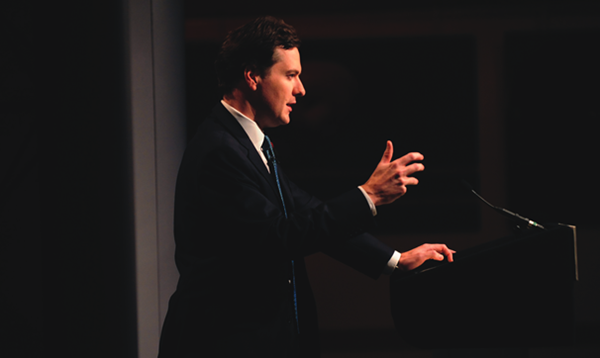The state to come: John O’Farrell
There is an alternative to cuts, John O’Farrell contends, as he explains the private sector’s dependence on public spending and calls for investment to aid recovery. A stronger sense of service can challenge the selfishness which caused the economic turmoil.
By this time next year, there will not be a single man, woman, child, school, business, clinic, factory, shop, office, police station or prison unaffected by the planned cuts in public spending. The skies are darkening and it’s going to rain cats and dogs and monkeys. Umbrellas won’t work. We need to build proper flood defences, especially here in Northern Ireland.
What is not being sufficiently discussed is an alternative to the austerity agenda being pushed by the Con-Dem coalition (which has no mandate from Northern Ireland), most media commentators (especially the foreign-owned press) and ‘independent’ economists (largely employed by bailed-out banks).
Back in the 1980s, Labour’s Denis Healey famously described Mrs Thatcher’s economic ideology as “sadomonetarism.” Business groups and bank economists who are screaming for austerity measures to slash the Government’s deficit in order to please the bond markets, despite the clear evidence that such measures would damage their own sectors first, are acting like masochists.
Already, the public sector is practising austerity. For months now, there has been a recruitment freeze which is already leading to closed hospital wards. Managers across all public services are being urged to reign in spending by as much as possible, and this has tightened conditions for private sector suppliers of services to the public sector.
It is not commonly realised just how important public procurement is to the local private sector. Last February, the Committee for Finance and Personnel issued a report which outlined the scale of public procurement and its importance to the wider economy. The Executive spends 25 per cent of its total budget on buying services from the private sector: £2.4 billion.
“Government contracts include catering, transport, banking, construction, printing, telecoms, ICT (hardware), travel, vehicle maintenance, advertising, stationery, furniture/office equipment supply, security, messenger services, economic/research consultancy, staff recruitment” and other services.
In addition, “the NI public procurement market also includes an estimated spend of £300m per annum on local government purchasing. In terms of the all-island context, the combined procurement market is worth around €19 billion (£15.2 billion).”
Remember those figures next time you hear some ‘independent economist’ blab on about how the public sector is a drag upon the entrepreneurial spirit of the private sector. Also bear this in mind. Across the UK, the public sector spends more on the private sector (£175 billion) than it does on its ‘pampered’ workforce. In short, if the private sector has a bad dose of the ‘flu at present, enormous cuts in public spending will give it full-blown pneumonia.
That is one of the reasons why almost every MLA and corporate shill who chant “There Is No Alternative” is wrong. Of course there are alternatives. That is the point of living in a democracy, and not ‘Northern Ireland plc’. We do not elect the bond markets, or the chairs of ‘our’ bailed-out banks. For that matter, Northern Ireland did not elect a single MP with a mandate to support George Osborne and his helper, Danny Alexander*.
Time to invest
 Cutting corporation tax is not an alternative. Nor is designating Northern Ireland as a ‘special economic area’ if it means cutting welfare payments and diminishing public servants’ wages to ‘match’ the average pay across the private sector. The real pay gap is between private sector workers here and the rest of the UK, and cuts in public sector wages will only hurt the retail and financial sectors even more. In a recession, you invest. The alternative risks stagnation and a lost decade or even longer.
Cutting corporation tax is not an alternative. Nor is designating Northern Ireland as a ‘special economic area’ if it means cutting welfare payments and diminishing public servants’ wages to ‘match’ the average pay across the private sector. The real pay gap is between private sector workers here and the rest of the UK, and cuts in public sector wages will only hurt the retail and financial sectors even more. In a recession, you invest. The alternative risks stagnation and a lost decade or even longer.
Half of the 55,000 on the live register are jobless for more than a year, and two other factors are increasing the danger of long-term unemployment. Those who have lost their jobs in the past 30 months are less skilled. Only 4 per cent of claimants have degrees, and the suggestion is that troubled firms are ‘hoarding’ their skilled workers and disposing of their lower skilled workers.
For those workers, getting a foot back on the ladder is getting more difficult. According to DETI figures, there are nine claimants per job vacancy, compared to two per vacancy in April 2008. If you add to those 55,000, the 45,000 of the ‘economically inactive’ who want to work, then we have an unhealthy competition for limited resources.
We need to invest in the skills of those 100,000 people and build the conditions for an economy which can accommodate their talents. We should use public procurement to assist local businesses, especially SMEs, and to invest in apprenticeships. If ‘fairness’ is to be at the core of ‘efficiencies’ we should save on expensive consultants and abandon the wasteful private finance initiative. We should invest in a fully integrated public transport system for sound reasons of public health, long-term economics and sustainable development.
We should invest in the Green New Deal which in the short term could create 24,000 jobs by making homes and public buildings energy efficient; a pilot programme is already underway in Newry and there are several variations operating across the UK. We should be developing our tiny R&D sector to engineer the technologies for a cleaner planet. We should be making our public sector most responsive to the needs of the most vulnerable and not give up on such aims as the abolition of child poverty by 2020.
We can pay for this by collecting taxes which are presently avoided, evaded or uncollected, estimated at £123 billion every year. Instead of cutting 25,000 posts at HM Revenue & Customs, we should be recruiting more tax collectors and reversing the ideology of the past three decades that taxes are some form of theft by faceless bureaucrats.
Fair taxes and services such as universal benefits do more than pay for each other. They cement a common bond between the citizen and the state, and reinforce the responsibility each has to the other. Public services are the fairest way to show that “we are all in this together”, better than any flag or patriotic ballad.
While we are doing that, we need to rethink our priorities. Selfishness got us to where we are, with the most selfish doing best of all. If we wish to turn this crisis into an opportunity, let’s aim at challenging the lure of the self with the idea of service.
*I used to work with Danny at Britain in Europe, who was a good press officer and is a nice bloke. However, if he had much to say about economics, he kept it to himself.






